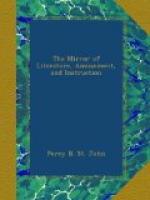R.—I think I understand the gist of your complaint: the longer you allow folks to live, the more they won’t die. Fie upon them!
S.—I shudder at the contemplation of the consequences of Parr’s abominable example. Well had it been for posterity if some one had killed the cent-sexagenarian at the outset of his wicked career.
K.—Horrible! that would have been Parr-icide!
* * * * *
DUELLING.
N.—Apropos of duelling. I hear that General F—rn—r is dead. He was the most celebrated, or, I ought to say, the most notorious duellist in France—at a time, too, when duelling was most the rage. He had been a great favourite of Napoleon’s. Having the command of a regiment, upon—I forget what occasion—he led it with such extraordinary bravery to the attack, yet, at the same time, conducted its movements with so total a want of skill and discretion, that, without attaining any good result, his men were nearly all cut to pieces, and he himself narrowly escaped with his life. As a reward for his gallantry, his Imperial master promoted him to the rank of general; but, to mark his sense of F—rn—r’s total want of “the better part of valour,” he never after entrusted him with a command. So fatal was his skill in duelling, that, when I knew him in Paris, he was under an interdiction of the police ever to fight again. The terms of one of the duels in which he had been engaged were, that the parties should fire at eight paces, and that they should alternately advance two paces till the fire of one or both of them should take deadly effect. According to this arrangement, the last advance brought the muzzle of his pistol close to his adversary’s breast—he had twice already wounded him slightly, and received one shot himself—he fired, and his adversary fell dead at his feet! This piece of butchery—for as such it must be stigmatized—having been perpetrated under sanction of the articles of the meeting, passed over without receiving any severe notice. No wonder he was an unhappy man. I met him one day at dinner. On that occasion he was boisterous in his mirth, without appearing to be gay.—Suddenly he rose and left the room. Half an hour afterwards we found him in a small boudoir at the farther end of the apartment, stretched on a sofa—writhing, groaning, and gnashing his teeth: I thought of Richard in the tent scene. I once heard him say—(I must give part of his expression in his own words, for terrible as they are, they are, at the same time, so simple, that they would lose their force in translation)—“J’ai la bras fatal! if I fire at a mark ten to one I miss it: I never miss a man.” His look and tone, as he uttered this, were as of one who should speak of an attendant demon, from whose dominion he had no power of escape.




